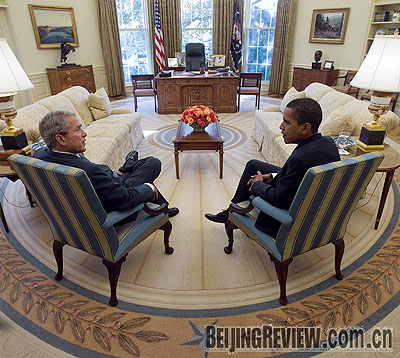|
 |
|
FACE TO FACE: U.S. President-elect Barack Obama meets George W. Bush in the White House on November 10 (XINHUA/AFP) |
Barack Obama has brought confidence and hope to frustrated Americans. They are in much higher spirits than a few months ago, all counting on their newly elected leader to find a way out of the current predicament.
Against this backdrop, Obama seems poised to adjust America's domestic and foreign policies. Although he has yet to clarify the changes that he will bring about, there is no doubt that reversing the conservatism that has been prevalent in the U.S. political world since Ronald Reagan's presidency, reshaping the country with the economic, diplomatic and social policies of the Democratic Party and abolishing the elitist decision making in Washington are on Obama's list of priorities. The change Obama advocates is not the adjustment of the administration's policies every four or eight years or the change from a Republican administration to a Democratic one. It is a political U-turn from conservatism to liberalism-a social reshuffle that takes place every 30 years.
Social reshuffle
Most Americans are eager to see their society undergo a major restructuring. An opinion poll in early October showed that 89 percent of Americans believed that the United States was on the wrong track. In the face of worsening crises, Americans were anxious for change. Even conservative states that supported the Republicans in 2004 because of moral issues such as abortion and gay marriage voted for Obama this year. With the support of the public, the Democrats have increased their majority in both houses of Congress, bringing their political power to its greatest height in decades.
Obama is quite popular with the Europeans and Japanese. Countries at odds with the United States such as Iran, Russia and North Korea have some expectations for him as well. A clear political vision, strong public support, the Democratic Party's control of both the White House and Congress, and popularity abroad are all favorable factors for Obama to introduce new policies after taking office.
Despite these, Obama confronts grave challenges in his bid to build a "new America." First, the legacy from the Bush administration is discouraging. After he takes the oath of office in January next year, Obama will have to deal with the wars in Afghanistan and Iraq, a reemerging Russia, anti-American regimes in the Middle East, South America and Africa, lingering nuclear issues in North Korea and Iran as well as the global financial crisis and the ensuing appeals for the United States to carry out reforms. At home, the financial crisis has taken a heavy toll on the real economy. The unemployment rate has reached a 10-year record high. Social problems have become increasingly prominent, with poor people struggling to make ends meet. The political divide between the Democrats and the Republicans is wider than ever before. Obama won the White House precisely because these problems had worn out the Bush administration. Addressing them, however, would be a demanding task for any politician.
We should also take note of the broader political and economic concerns that will haunt the next U.S. president. The first is the collapse of the new economy. The information and knowledge-based economy has gained momentum in the United States since the 1990s. As global capital poured into the country, the U.S. economy flourished. However, with the collapse of the economic bubble, the spillover effect of the new economy has vanished. The international community's perception of the world economy has returned to a reasonable level. The Americans can no longer afford to have fun under debt.
The second is the end of the "peace dividend." America's political and moral influence peaked shortly after the Cold War. It effectively cut military spending by strengthening and expanding its alliances. As it pursued globalization, the United States achieved sustainable economic expansion. It also enjoyed unparalleled political prestige and soft power as the winner of the Cold War and the only superpower in the world. With the worsening of the international situation and the rise of emerging powers, the United States has found it difficult to maintain this position in recent years. The war in Iraq, in particular, has severely undermined its soft power.
The third is the increasing costs of U.S. hegemony. Before the September 11 terrorist attacks in 2001, the United States maintained its hegemony mainly by ensuring the unity of the international market and the stability of the international order. Today, however, it has to pay a heavy cost for homeland security. While deploying more troops and intelligence agents overseas and sponsoring pro-U.S. regimes, the United States has strengthened monitoring of its citizens at the expense of their highly valued freedoms.
| 